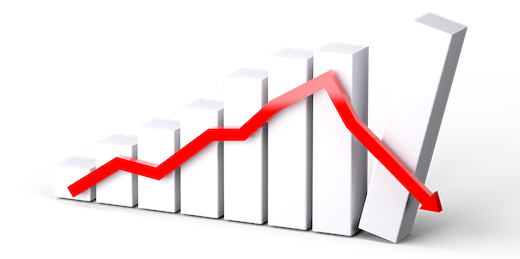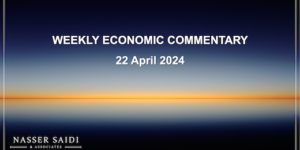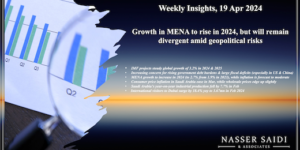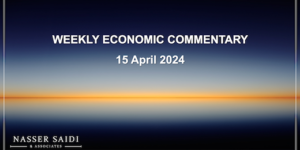Markets
As the coronavirus spread to nearly 60 nations, global stock markets posted their worst weekly fall since the global financial crisis and wiped about over USD 5trn from their market value. MSCI’s flagship global equity index (MSCI ACWI Index) was down nearly 10%, S&P 500 lost more than 10% since hitting a record high on Feb 19, markets in Europe were down, while in Japan, the market slide almost 4% on fears that the Jul-Aug Olympics might be called off. Regional markets were mostly down on virus fears, with many nations reporting rapid spread after announcing first cases. On the currency front, the dollar slipped to a 20-week low vis-à-vis the JPY after Fed chair hinted a rate cut to support the economy as the coronavirus spreads. Gold price touched a 7-year high before posting its biggest one-day drop since 2013 on Fri. Oil prices fell – Brent, down 14%, posted the steepest weekly decline since 2016 while WTI fell 16%, recording the biggest weekly decline since Dec 2008 – ahead of the OPEC+ meeting on Mar 5-6 to discuss deeper output cuts.
Global Developments
US/Americas:
- US GDP was unrevised at a 2.1% annualized rate in Q4, hence posting an unrevised 2.3% growth for the full year 2019 – the slowest in 3 years. Growth was supported by a smaller import bill, but the latest estimate shows downgrades to consumer spending, business investment and government spending.
- The PCE price index edged up by 0.1% in Jan (Dec: 0.3%), as energy costs fell by 0.7% though food prices gained 0.3%. Core PCE edged up 0.1% mom and 1.6% yoy in Jan (Dec: 0.2% mom and 1.5% yoy). Personal income jumped 6% in Jan – the most since Feb 2019 – after Dec’s 0.1% gain. Consumer spending inched up by 0.2% in Jan (Dec: 0.4%).
- Durable goods orders declined by 0.2% mom in Jan (Dec: +2.9%), pulled down by decreased demand for cars, auto parts, and military aircraft. Excluding volatile transportation orders, durable goods orders rose 0.9% – the fastest since Apr 2018. Non-defense capital goods orders excluding aircraft increased by 1.1% yoy.
- US Chicago Fed national activity index improved to -0.25 in Jan from -0.51 registered in Dec (revised lower from -0.35).
- US S&P/ Case Shiller national home price indices increased by 3.8% yoy in Dec (Nov: 3.5%); the 20-city composite rose 2.9%, up from 2.5% in the previous month. At the national level, home prices are 59% above the trough reached in Feb 2012, and 15% above their pre-financial crisis peak.
- New single-family home sales picked up by 7.9% mom in Jan, posting the quickest pace since Jul 2007. Pending home sales, a leading indicator for the housing sector, grew by 5.2% mom in Jan – rising by the most since Oct 2010.
- Goods trade deficit in the US narrowed by 4.6% mom to USD 65.5bn in Jan, as imports dipped (-2.2% mom to USD 201.25bn) much faster than exports (-1% to USD 135.75).
- Chicago PMI rose to a 6-month high of 49 in Feb (Jan: 42.9), though remaining for the 6th straight month in contractionary territory. Only the employment sub-indicator posted losses, as production and demand for new orders rose to 8- and 6-month highs respectively.
- Initial jobless claims climbed by 8k to 219k, with the 4-week moving average rising to 209.75k. Continuing claims meanwhile fell by 9k to 1.72mn.
Europe:
- Detailed data showed stagnant Q4 GDP in Germany: exports fell by 0.2% qoq while gross investment (including construction) rose by 2.9%. For the full year, Germany grew by 0.6% – the weakest since the eurozone debt crisis in 2013.
- German inflation moved up to 1.7% yoy in Feb (Jan: 1.6%) – the highest since Apr 2019 – supported by higher food prices (+3.3%). Lower energy prices slowed French and Italian inflation by 0.1 ppts, to 1.4% and 0.4% respectively.Separately, German unemployment rate remained stable at 5.5%, with the total unemployed declining by 10k.
- German Ifo business climate edged up to 96.1 in Feb (Jan: 96) while the current assessment deteriorated to 98.9 (Jan: 99.2). Companies were less pessimistic about the future though, as expectations surged to 93.4 from 92.9 the month before.
- EU economic sentiment indicator increased to 103.5 in Feb (Jan: 102.6); business climate also improved -0.04 (-0.19) while consumer confidence came in at -6.6, up from -8.1 in Jan.
Asia Pacific:
- All-time PMI lows hit in China, as the coronavirus epidemic disrupts production and supply chains: official manufacturing PMI dropped to 35.7 in Feb from 50.0 in Jan, much below the 38.8 figure reported in Nov 2008. The non-manufacturing PMI also dropped, to 29.6 – the lowest since Nov 2011 –from 54.1 the month before. The composite PMI dropped to 28.9 from 53.0 in Jan.
- India’s GDP growth slowed to 4.7% in Oct-Dec, from the upwardly revised 5.1% the quarter before. For Apr-Dec, growth was 5.1% vs 6.3% during the same period a year ago.
- Japan leading economic index in Dec rose to 91.6 from Nov’s decade-low 90.8 reading.
- Tokyo CPI excluding fresh food eased to 0.5% in Feb (Jan: 0.7%).
- Industrial production in Japan declined by 2.5% yoy in Jan (Dec: -3.1%); in mom terms, production climbed by 0.8%. Retail sales in Japan fell by 0.4% yoy in Jan following a 2.6% slide in Dec.
- Unemployment rate in Jan jumped to 2.4% in Jan (Dec: 2.2%), rising for the first time in 4 months. The seasonally adjusted number of unemployed grew by 7.9% mom to 1.64mn in Jan, partly due to an increase in the number of mid-career jobseekers.
- Hong Kong announced HKD 120bn (USD 15.4bn) worth measures to support the economy, hit by the pro-democracy protests and more recently the coronavirus scare. Measures include a HKD 10k payout to permanent residents above 18 years, as well as low-interest loans for SMEs. GDP declined by 1.2% last year – the first annual GDP decline since 2009 – with consumer and tourism spending dragging down growth.
- Singapore inflation remained steady at 0.8% yoy in Jan; core inflation dropped sharply to 0.3% in Jan – the lowest since Dec 2015.
- Industrial production in Singapore accelerated by 18.2% mom in Jan from an upwardly revised 6.3% in Dec; the volatile pharmaceutical sector production surged by 59.4% yoy while electronics manufacturing dropped by 7.2%.
Bottom line: Most new virus cases are now being reported outside China – the origin – with South Korea, Italy, Japan, and Iran emerging as new epicentres. The WHO has stayed clear of calling it a pandemic, raising its risk assessment to “very high” (the topmost level), but the VIX (“fear”) index jumped to 49, its highest since early 2009. Events are being cancelled across the globe – Mobile World Congress, Geneva motor show, Baselworld trade show, football matches in Italy and France, and a half-marathon in Paris among others – raising worries whether the Tokyo Olympics will go ahead as planned in Jul-Aug.
Regional Developments
- Coronavirus is spreading in the GCC: with Iran as an epicenter (more than 40 deaths and 100s of infected), many countries including Kuwait, Oman and Bahrain have confirmed multiple cases. With around 45 confirmed cases, Kuwait has suspended schools for 2 weeks and called for its citizens to avoid travelling. Bahrain, which has 36 cases, has suspended all flights to the UAE; Oman has 6 cases while Saudi Arabia and Qatar are the only GCC nations to have not reported any coronavirus cases. Saudi Arabia has imposed a temporary suspension on the entry of pilgrims, including those from the GCC, to Makkah and Medina. The UAE has 21 cases, of which 5 have recovered: though schools and businesses remain open, the former have been advised not to hold events or schedule internal and external trips. News reports cancellation of few sports and business events in the region while the UAE central bank has also asked banks to grant temporary deferrals on monthly loan payments and reduce fees and commissions for customers affected by the coronavirus.
- The Bahraini dinar has been included as a settlement currency in the Arab Monetary Fund’s Buna payment platform, alongside the USD, EUR, Jordanian dinar, Saudi riyal and the UAE dirham.
- Bahrain’s MPs approved an amendment to the 2012 Private Sector Employment Law to provide women working in the private sector two hours a day to care for their newborns for up to two years. Currently, in the private sector, a woman is permitted to take two hours off for 6 months, and an hour a day till the baby is a year old.
- Egypt’s nominal GDP grew by 20% to EGP 5.3trn in 2018-19, revealed the country’s minister of planning; the growth was supported by investment spending (contributed 40% to growth), net change in exports (30%) and consumer spending (20%). Additionally, private-sector investments rose by 77% yoy to EGP 444bn at end of the fiscal year 2018-19.
- Investments in Egypt’s industrial sector grew by 22% yoy to EGP 99.5bn in 2018-19; in current prices, manufacturing GDP grew by 17.9% to EGP 846bn in 2018-19.
- The natural gas sector in Egypt grew by 21% during 2018-19, also contributing 19% to Egypt’s GDP growth. According to the minister of petroleum, investments in the gas sector reached about EGP 1trn, including EGP 500bn in completed projects, EGP 280bn in under-construction projects, and EGP 220bn in planned projects.
- Non-oil exports from Egypt increased by 4% yoy to USD 2.188bn in Jan 2020, thanks to a 15.8% and 10.5% pick up in exports of food industries and building materials respectively.
- Egypt’s trade deficit narrowed by 10.8% to USD 3.45bn in Dec 2019. Exports grew by 0.5% to USD 2.59bn while imports declined by 6.2% to USD 6.04bn.
- Egypt’s exports to the US surged by 31% yoy to USD 2.93bn in 2019. Separately, bilateral trade between Egypt and South Korea increased to USD 1.595bn last year, with the latter’s investments in Egypt totaling USD 570mn in 181 projects.
- According to Egypt’s central bank, foreign investments in treasury bills accelerated by 13.8% mom to EGP 289.4bn in Jan 2020.
- Total microfinance beneficiaries in Egypt grew by 11.8% yoy to 3.5mn customers at end-2019; value increased by 47% yoy to EGP 26.1bn.
- Iraq’s parliament delayed voting on the new government last week, as it failed to convene a quorum. The former PM Abdul Mahdi remains in a caretaker capacity.
- Jordan’s trade balance deficit narrowed by 12.2% yoy to JOD 7.8bn in 2019. Exports increased by 7.3% to JOD 5.9bn while imports declined by 4.8% to JOD 13.7bn.
- Jordan increased its minimum wages to JOD 260 effective as of Jan 1, 2021; the new minimum pay will also be subject to social security deductions.
- Lebanon appointed US investment bank Lazard and law firm Cleary Gottlieb Steen & Hamilton LLP as its financial and legal advisers on the widely expected debt restructuring. Reuters reported, citing a government source, that the country intends to ask for a seven-day grace period for the USD 1.2bn Eurobond that matures on Mar 9.
- Oman plans to tender out 15 to 20 pre-approved mining blocks for exploration and commercial development during the course of 2020.
- With the coronavirus outbreak, Saudi Arabia has imposed a temporary ban on foreign Haj pilgrims. However, there are no travel restrictions on those holding employment visa, work visit visa, business visit visa and family visit visa.
- Saudi Arabia’s foreign reserves expanded by 2.4% yoy to SAR 1.88trn in Jan. Assets increased by 2.54% yoy and 0.5% mom to SAR 1.91trn.
- Saudi Arabia has issued additional licensing guidelines for digital-only banks in the country. Conditions include that it should be set up as a locally incorporated joint-stock company and maintain a physical presence in Saudi Arabia. (More details: https://bit.ly/3cmTttu). The regulator is reviewing license requests for two digital banks, as per a report in local daily Aleqtisadiyah.
- Saudi Aramco’s CEO stated that there were no plans for a secondary listing for one year from the initial offering, with an international listing “something we will be discussing later”.
- Saudi Arabia’s imports grew by 18.3% yoy to SAR 49.59bn in Dec; exports declined by 6% to SAR 85bn.
- Investments in MENA’s water desalination market will likely touch USD 4.3bn by 2022, according to a report by Ventures Onsite; currently, 48% of global water desalination projects are happening within the MENA region.
UAE Focus
- The central bank estimated that UAE grew at 2.9% last year, up from 1.7% the year before. Non-oil sector GDP grew at just 1.1% last year – the slowest pace since at least 2011 – down from 2018’s 1.3%.
- Inflation in the UAE fell by 1.6% in Q4 2019 vs a drop of 2.1% in Q3. The central bank stated that the decline eased due to “the pickup in non-energy growth and employment”.
- Employment in UAE’s private sector increased by 2% yoy in Q4, registering the highest growth in the last seven quarters and higher than Q3’s 1.1% increase. Though the construction and real estate and business services sectors together accounted for 45.1% of the labour force, employment in the former dipped (Q4: -2.4% from Q3’s -2.3%). The central bank’s estimates are based on Ministry of Human Resources and Emiratization data which excludes free zones.
- UAE banks’ investments in Saudi Arabia account for 54% of total banking investments (AED 141.4bn or USD 38.5bn) in the four GCC states (Saudi, Bahrain, Oman and Kuwait).
- UAE’s gold reserves increased to AED 5.31bn in Jan from Dec’s AED 4.04bn.
- Dubai’s non-oil foreign trade rose by 6% yoy to AED 1.37trn in 2019: exports accelerated by 22% to AED 155bn while imports were up 3% to AED 796bn.
- Dubai Economy’s Business Registration and Licensing sector disclosed the issuance of 4692 instant licenses since the service was launched in Jul 2017; of this 73.5% were commercial.
- With the listing of a USD 400mn sukuk in Nasdaq Dubai by Sar Al-Arkan, a Saudi-based real estate development company, the exchange expanded its role as one of the largest global centres for sukuk listings by value with a current total of USD 66.4bn.
- Expat remittances from the UAE increased to AED 165bn (USD 44.9bn) in 2019, according to the central bank. India was the top recipient nation, followed by Pakistan, Philippines, Egypt, UK and Bangladesh.
- UAE’s Ras al Khaimah emirate welcomed 11.2mn tourists last year, up 4% yoy. Revenue per available room stood at USD 114.90 – among the highest in the region – while occupancy rates averaged 74%.
Media Review
Making sense of India’s GDP
https://www.bloombergquint.com/opinion/making-sense-of-indias-gdp-data-amid-its-many-revisions
Why penguins may help us predict the impact of climate change
https://www.ft.com/content/1d5e039a-582f-11ea-a528-dd0f971febbc
When China Sneezes
https://www.project-syndicate.org/commentary/china-coronavirus-shock-prospects-for-global-recession-by-stephen-s-roach-2020-02
Coronavirus, a new jolt to Iran’s economy?
https://www.piie.com/blogs/realtime-economic-issues-watch/coronavirus-new-jolt-irans-economy
Thomas Piketty’s new book that sets out the case for socialism may prove as famous—and controversial—as its predecessor
https://www.economist.com/books-and-arts/2020/02/29/the-worlds-most-famous-economist-sets-out-the-case-for-socialism
Powered by:







